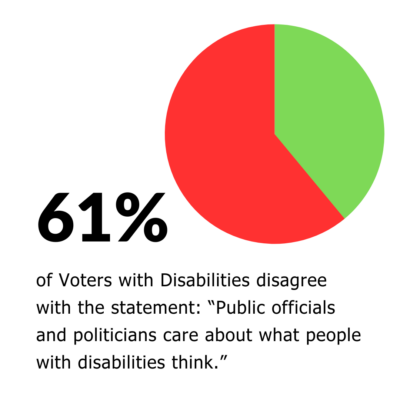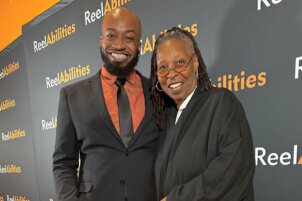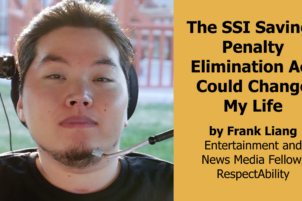 It has long been a source of consternation to members of the disability community that political candidates and elected officials rarely speak publicly about issues specific to disabled voters. In fact, few politicians even address how broader issues that they do speak about impact people with disabilities. After most presidential debates, there is a predictable barrage of social media posts from disabled voters who are disappointed that the candidates never mentioned the word “disability,” let alone addressed some of the issues that impact our daily lives the most.
It has long been a source of consternation to members of the disability community that political candidates and elected officials rarely speak publicly about issues specific to disabled voters. In fact, few politicians even address how broader issues that they do speak about impact people with disabilities. After most presidential debates, there is a predictable barrage of social media posts from disabled voters who are disappointed that the candidates never mentioned the word “disability,” let alone addressed some of the issues that impact our daily lives the most.
It turns out that the disappointment shared by disabled social media users is more widespread than many might have imagined. According to a recent poll by the think tank Data For Progress, “a majority of disabled voters don’t believe politicians care about the disabled community.”
61% of likely voters with disabilities who were polled disagreed with the statement, “Public officials and politicians care about what people with disabilities think.” Interestingly, 50% of the non-disabled voters who were polled agreed with them. This held true across party lines; 58% of all Democrats polled and 52% of all Republicans disagreed with the statement that politicians care about disabled voters.
According to RespectAbility’s State Policy Manager Jimmy Fremgen, this is to the detriment of both voters with disabilities and the candidates and elected officials themselves.
“I don’t think most public officials regularly consider people with disabilities, but they should,” said Fremgen. “Any time you’re putting forth a policy that affects more than three people, you’re affecting a person with a disability.”
The Centers for Disease Control and Prevention state that “27% of adults in the United States have some type of disability.” Therefore, when legislators consider a bill that affects people in their state or district, more than one-fourth of those people will likely have either apparent or non-apparent disabilities.
“People with disabilities are the largest minority group in the country and the only group that anyone can join at any time,” said RespectAbility Policy Associate Rostom Dadian. “If you’re not considering people with disabilities, you’re willfully excluding a massive percentage of our population.”
When candidates don’t address the disabled voters in their district, they are missing not only the opportunity to appeal strongly to a large number of voters, but also the opportunity to elicit the campaign contributions and campaign volunteer hours of these voters and their families. When people aren’t used to hearing candidates speak at all about the issues that most impact their daily lives, a candidate who speaks out about employment discrimination among workers with disabilities, low expectations in education for disabled children, or the lack of affordable, efficient, accessible transportation can tap into a passionate and motivated pool of people and their families. When voters are highly motivated by a candidate, they are also more likely to put in time phone banking, text banking, or door-knocking for that candidate.
Furthermore, people with disabilities represent every political, geographic, racial, ethnic, gender, immigration, and religious status. There are disabled millennials, senior citizens, soccer moms, NASCAR dads, immigrants, church-goers, LGBTQ+ people, and swing voters. Regardless of which group a candidate considers their base, people with disabilities are a part of it.
According to the study, a majority of voters think both parties should be doing more to protect the rights of Americans with disabilities. 59% of all voters thought the Democratic Party should be doing more to protect the rights of disabled Americans and 63% of all voters thought the Republican Party should be doing more.
RespectAbility looks forward to engaging candidates and elected officials of all parties to ensure that they understand how the bills and regulations they put forward impact large numbers of their constituents. As we continue to develop our policy agenda and our legislative priorities for the next year, the RespectAbility policy team is prepared to proactively reach out to legislators and policymakers and we stand ready to assist any candidates or elected officials who reach out to us to better understand the perspective of disabled Americans.
We look forward to demonstrating to both candidates and elected officials that people with disabilities are an engaged and motivated voting block who will support and work for policymakers who support and work for them.








I am from Canada and the numbers may be a bit different but, similar. However, after Trump’s obvious ableist rhetoric, I am curious as to the American voting disabled split between Red & Blue. Any thoughts? And if an even split… any idea why?